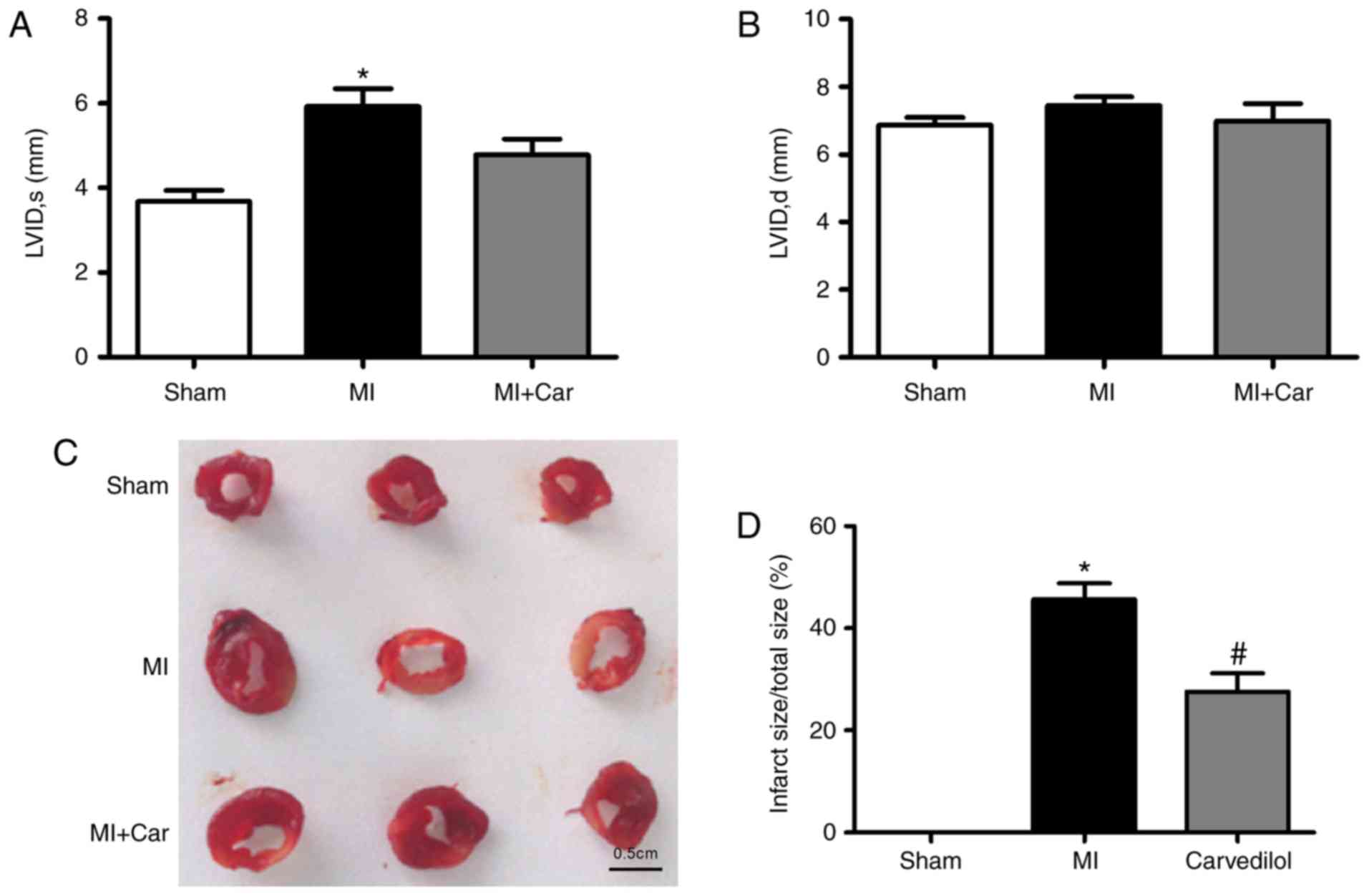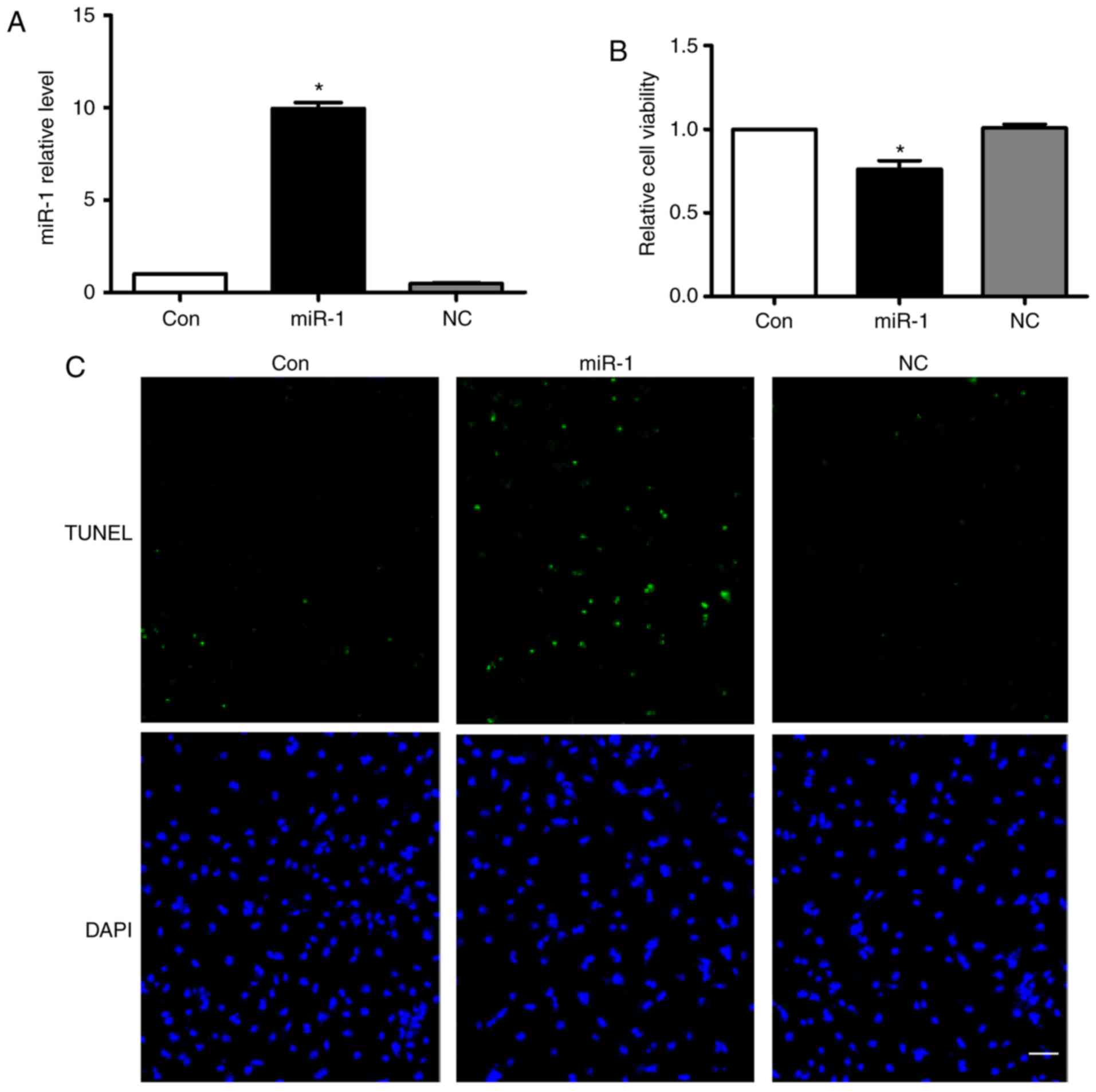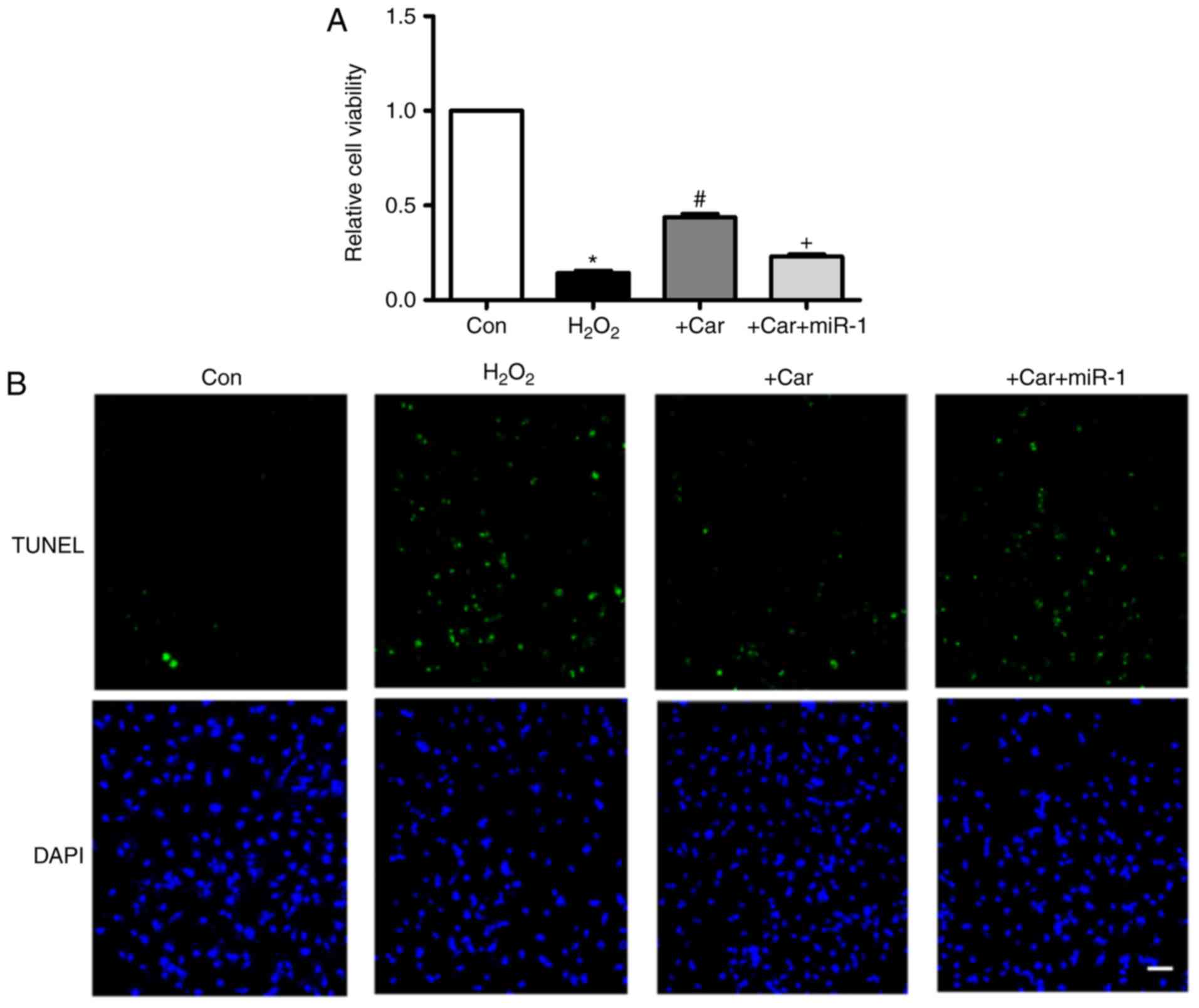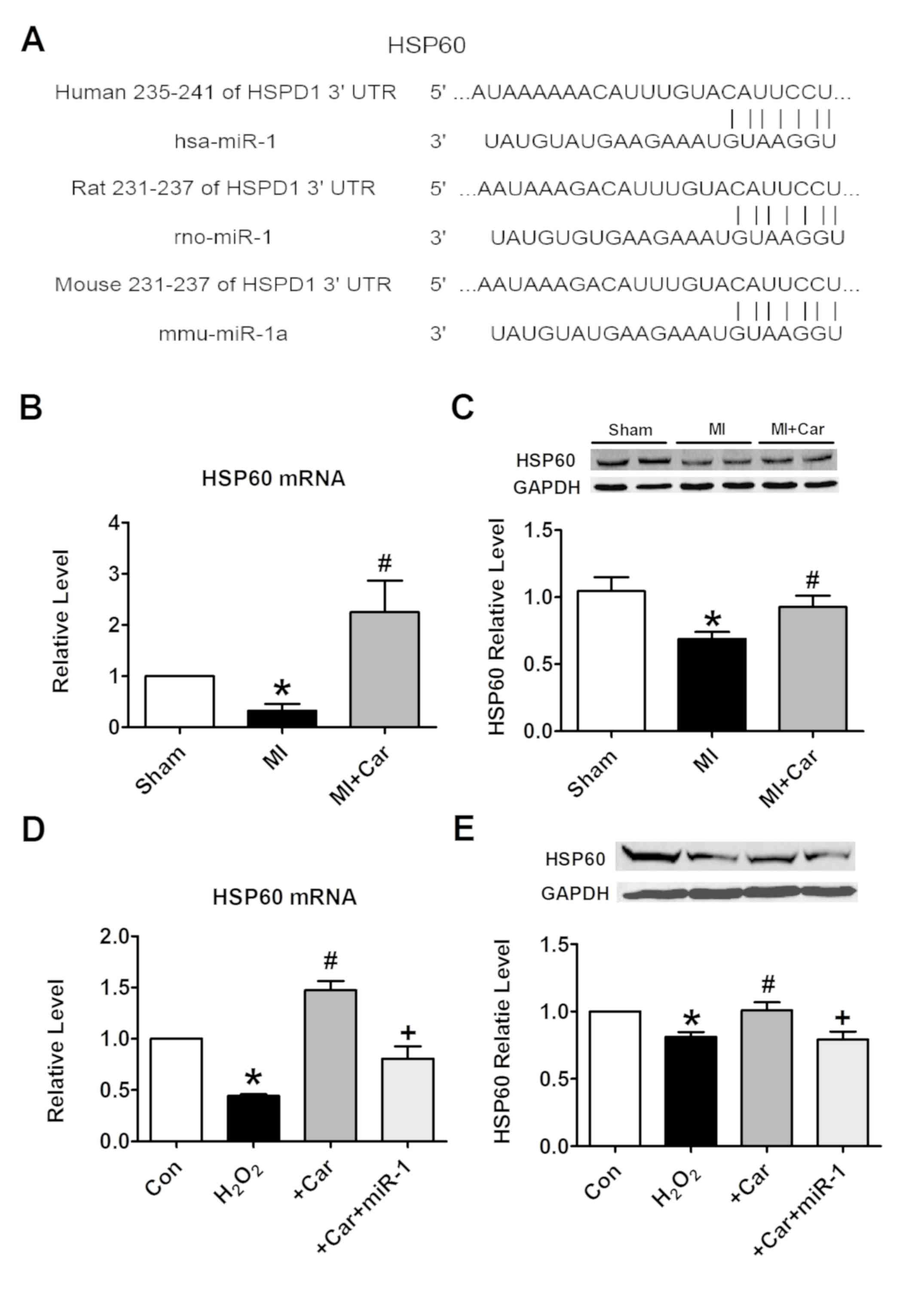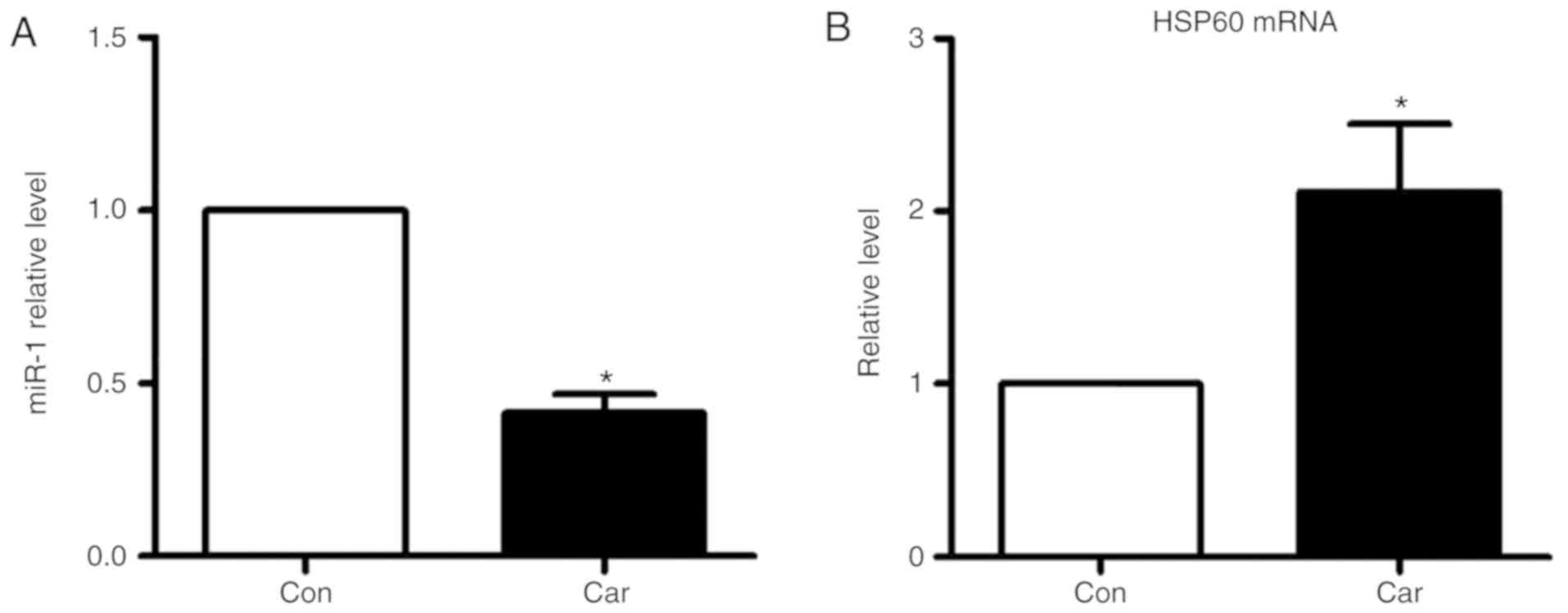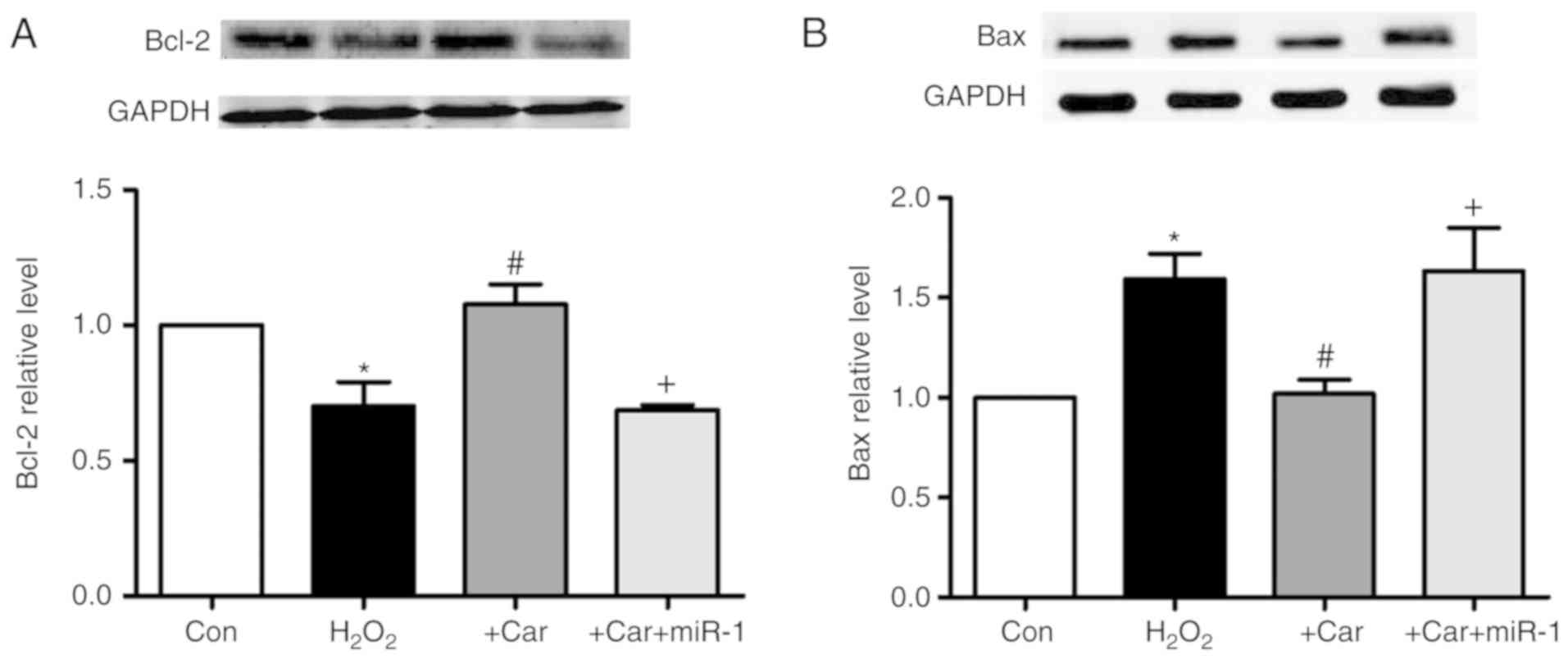|
1
|
Writing Group Members, Mozaffarian D,
Benjamin EJ, Go AS, Arnett DK, Blaha MJ, Cushman M, Das SR, de
Ferranti S, Després JP, et al: Heart disease and stroke
statistics-2016 update: A report from the American Heart
Association. Circulation. 133:e38–e360. 2016.PubMed/NCBI
|
|
2
|
Sun T, Dong YH, Du W, Shi CY, Wang K,
Tariq MA, Wang JX and Li PF: The role of microRNAs in myocardial
infarction: From molecular mechanism to clinical application. Int J
Mol Sci. 18(pii): E7452017. View Article : Google Scholar : PubMed/NCBI
|
|
3
|
Liu Q, Zhang J, Xu Y, Huang Y and Wu C:
Effect of carvedilol on cardiomyocyte apoptosis in a rat model of
myocardial infarction: A role for toll-like receptor 4. Indian J
Pharmacol. 45:458–463. 2013. View Article : Google Scholar : PubMed/NCBI
|
|
4
|
Palojoki E, Saraste A, Eriksson A, Pulkki
K, Kallajoki M, Voipio-Pulkki LM and Tikkanen I: Cardiomyocyte
apoptosis and ventricular remodeling after myocardial infarction in
rats. Am J Physiol Heart Circ Physiol. 280:H2726–H2731. 2001.
View Article : Google Scholar : PubMed/NCBI
|
|
5
|
Oliveira PJ, Marques MP, Batista de
Carvalho LA and Moreno AJ: Effects of carvedilol on isolated heart
mitochondria: Evidence for a protonophoretic mechanism. Biochem
Biophys Res Commun. 276:82–87. 2000. View Article : Google Scholar : PubMed/NCBI
|
|
6
|
Wang R, Miura T, Harada N, Kametani R,
Shibuya M, Fukagawa Y, Kawamura S, Ikeda Y, Hara M and Matsuzaki M:
Pleiotropic effects of the beta-adrenoceptor blocker carvedilol on
calcium regulation during oxidative stress-induced apoptosis in
cardiomyocytes. J Pharmacol Exp Ther. 318:45–52. 2006. View Article : Google Scholar : PubMed/NCBI
|
|
7
|
Nakamura K, Kusano K, Nakamura Y,
Kakishita M, Ohta K, Nagase S, Yamamoto M, Miyaji K, Saito H,
Morita H, et al: Carvedilol decreases elevated oxidative stress in
human failing myocardium. Circulation. 105:2867–2871. 2002.
View Article : Google Scholar : PubMed/NCBI
|
|
8
|
Yeh CH, Chen TP, Wang YC, Lin YM and Fang
SW: Carvedilol treatment after myocardial infarct decreases
cardiomyocytic apoptosis in the peri-infarct zone during
cardioplegia-induced cardiac arrest. Shock. 39:343–352. 2013.
View Article : Google Scholar : PubMed/NCBI
|
|
9
|
De Rosa S, Curcio A and Indolfi C:
Emerging role of microRNAs in cardiovascular diseases. Circ J.
78:567–575. 2014. View Article : Google Scholar : PubMed/NCBI
|
|
10
|
Latronico MV and Condorelli G: MicroRNAs
and cardiac pathology. Nat Rev Cardiol. 6:419–429. 2009. View Article : Google Scholar : PubMed/NCBI
|
|
11
|
Pan Z, Sun X, Ren J, Li X, Gao X, Lu C,
Zhang Y, Sun H, Wang Y, Wang H, et al: miR-1 exacerbates cardiac
ischemia-reperfusion injury in mouse models. PLoS One.
7:e505152012. View Article : Google Scholar : PubMed/NCBI
|
|
12
|
Shan ZX, Lin QX, Deng CY, Zhu JN, Mai LP,
Liu JL, Fu YH, Liu XY, Li YX, Zhang YY, et al: miR-1/miR-206
regulate Hsp60 expression contributing to glucose-mediated
apoptosis in cardiomyocytes. FEBS Lett. 584:3592–3600. 2010.
View Article : Google Scholar : PubMed/NCBI
|
|
13
|
Zhang Y, Sun L, Zhang Y, Liang H, Li X,
Cai R, Wang L, Du W, Zhang R, Li J, et al: Overexpression of
microRNA-1 causes atrioventricular block in rodents. Int J Biol
Sci. 9:455–462. 2013. View Article : Google Scholar : PubMed/NCBI
|
|
14
|
Zhang Y, Zhang L, Chu W, Wang B, Zhang J,
Zhao M, Li X, Li B, Lu Y, Yang B and Shan H: Tanshinone IIA
inhibits miR-1 expression through p38 MAPK signal pathway in
post-infarction rat cardiomyocytes. Cell Physiol Biochem.
26:991–998. 2010. View Article : Google Scholar : PubMed/NCBI
|
|
15
|
Tang Y, Zheng J, Sun Y, Wu Z, Liu Z and
Huang G: MicroRNA-1 regulates cardiomyocyte apoptosis by targeting
Bcl-2. Int Heart J. 50:377–387. 2009. View Article : Google Scholar : PubMed/NCBI
|
|
16
|
Lu Y, Zhang Y, Shan H, Pan Z, Li X, Li B,
Xu C, Zhang B, Zhang F, Dong D, et al: MicroRNA-1 downregulation by
propranolol in a rat model of myocardial infarction: A new
mechanism for ischaemic cardioprotection. Cardiovasc Res.
84:434–441. 2009. View Article : Google Scholar : PubMed/NCBI
|
|
17
|
AVMA Quidelines for the Euthanasia of
Animals, . 2013. American Veterinary Medical Association;
Schaumburg, IL: 2013, https://www.avma.org/KB/Policies/Documents/euthanasia.pdfJune
15–2016
|
|
18
|
Zhang Y, Li X, Zhang Q, Li J, Ju J, Du N,
Liu X, Chen X, Cheng F, Yang L, et al: Berberine hydrochloride
prevents postsurgery intestinal adhesion and inflammation in rats.
J Pharmacol Exp Ther. 349:417–426. 2014. View Article : Google Scholar : PubMed/NCBI
|
|
19
|
Livak KJ and Schmittgen TD: Analysis of
relative gene expression data using real-time quantitative PCR and
the 2(-Delta Delta C(T)) method. Methods. 25:402–408. 2001.
View Article : Google Scholar : PubMed/NCBI
|
|
20
|
Xu C, Hu Y, Hou L, Ju J, Li X, Du N, Guan
X, Liu Z, Zhang T, Qin W, et al: β-Blocker carvedilol protects
cardiomyocytes against oxidative stress-induced apoptosis by
up-regulating miR-133 expression. J Mol Cell Cardiol. 75:111–121.
2014. View Article : Google Scholar : PubMed/NCBI
|
|
21
|
Kurdi M and Booz GW: Carvedilol protects
the infarcted heart by upregulating miR-133: First evidence that
disease state affects β-adrenergic arrestin-biased signaling? J Mol
Cell Cardiol. 76:12–14. 2014. View Article : Google Scholar : PubMed/NCBI
|
|
22
|
Poirier L and Tobe SW: Contemporary use of
β-blockers: Clinical relevance of subclassification. Can J Cardiol.
30 (5 Suppl):S9–S15. 2014. View Article : Google Scholar : PubMed/NCBI
|
|
23
|
Poole-Wilson PA, Swedberg K, Cleland JG,
Di Lenarda A, Hanrath P, Komajda M, Lubsen J, Lutiger B, Metra M,
Remme WJ, et al: Comparison of carvedilol and metoprolol on
clinical outcomes in patients with chronic heart failure in the
carvedilol or metoprolol European trial (COMET): Randomised
controlled trial. Lancet. 362:7–13. 2003. View Article : Google Scholar : PubMed/NCBI
|
|
24
|
Remme WJ, Torp-Pedersen C, Cleland JG,
Poole-Wilson PA, Metra M, Komajda M, Swedberg K, Di Lenarda A,
Spark P, Scherhag A, et al: Carvedilol protects better against
vascular events than metoprolol in heart failure: Results from
COMET. J Am Coll Cardiol. 49:963–971. 2007. View Article : Google Scholar : PubMed/NCBI
|
|
25
|
Budni P, Pedrosa RC, Garlet TR, Dalmarco
EM, Dalmarco JB, Lino MR, Simionato EL, Amara JA, Frode TS and
Wilhelm Filho D: Carvedilol attenuates oxidative stress in chronic
chagasic cardiomyopathy. Arq Bras Cardiol. 98:218–224. 2012.(In
English). View Article : Google Scholar : PubMed/NCBI
|
|
26
|
Li YC, Ge LS, Yang PL, Tang JF, Lin JF,
Chen P and Guan XQ: Carvedilol treatment ameliorates acute
coxsackievirus B3-induced myocarditis associated with oxidative
stress reduction. Eur J Pharmacol. 640:112–116. 2010. View Article : Google Scholar : PubMed/NCBI
|
|
27
|
Zhuang XF, Yin CQ, Wang HY and Sun NL:
Distinctive effects of carvedilol in the non-infarct zone:
Remodelling of the ligated rat heart linked to oxidative stress. J
Int Med Res. 37:1354–1364. 2009. View Article : Google Scholar : PubMed/NCBI
|
|
28
|
Kim IM, Tilley DG, Chen J, Salazar NC,
Whalen EJ, Violin JD and Rockman HA: Beta-blockers alprenolol and
carvedilol stimulate beta-arrestin-mediated EGFR transactivation.
Proc Natl Acad Sci USA. 105:14555–14560. 2008. View Article : Google Scholar : PubMed/NCBI
|
|
29
|
Wisler JW, DeWire SM, Whalen EJ, Violin
JD, Drake MT, Ahn S, Shenoy SK and Lefkowitz RJ: A unique mechanism
of beta-blocker action: Carvedilol stimulates beta-arrestin
signaling. Proc Natl Acad Sci USA. 104:16657–16662. 2007.
View Article : Google Scholar : PubMed/NCBI
|
|
30
|
Gupta S and Knowlton AA: HSP60, Bax,
apoptosis and the heart. J Cell Mol Med. 9:51–58. 2005. View Article : Google Scholar : PubMed/NCBI
|
|
31
|
Kirchhoff SR, Gupta S and Knowlton AA:
Cytosolic heat shock protein 60, apoptosis, and myocardial injury.
Circulation. 105:2899–2904. 2002. View Article : Google Scholar : PubMed/NCBI
|
|
32
|
Hollander JM, Lin KM, Scott BT and
Dillmann WH: Overexpression of PHGPx and HSP60/10 protects against
ischemia/reoxygenation injury. Free Radic Biol Med. 35:742–751.
2003. View Article : Google Scholar : PubMed/NCBI
|
|
33
|
Lin KM, Lin B, Lian IY, Mestril R,
Scheffler IE and Dillmann WH: Combined and individual mitochondrial
HSP60 and HSP10 expression in cardiac myocytes protects
mitochondrial function and prevents apoptotic cell deaths induced
by simulated ischemia-reoxygenation. Circulation. 103:1787–1792.
2001. View Article : Google Scholar : PubMed/NCBI
|
|
34
|
Shan ZX, Lin QX, Fu YH, Deng CY, Zhou ZL,
Zhu JN, Liu XY, Zhang YY, Li Y, Lin SG and Yu XY: Upregulated
expression of miR-1/miR-206 in a rat model of myocardial
infarction. Biochem Biophys Res Commun. 381:597–601. 2009.
View Article : Google Scholar : PubMed/NCBI
|
|
35
|
Yang B, Lin H, Xiao J, Lu Y, Luo X, Li B,
Zhang Y, Xu C, Bai Y, Wang H, et al: The muscle-specific microRNA
miR-1 regulates cardiac arrhythmogenic potential by targeting GJA1
and KCNJ2. Nat Med. 13:486–491. 2007. View
Article : Google Scholar : PubMed/NCBI
|
|
36
|
Kim IM, Wang Y, Park KM, Tang Y, Teoh JP,
Vinson J, Traynham CJ, Pironti G, Mao L, Su H, et al:
β-arrestin1-biased β1-adrenergic receptor signaling regulates
microRNA processing. Circ Res. 114:833–844. 2014. View Article : Google Scholar : PubMed/NCBI
|
|
37
|
Bayoumi AS, Park KM, Wang Y, Teoh JP,
Aonuma T, Tang Y, Su H, Weintraub NL and Kim IM: A
carvedilol-responsive microRNA, miR-125b-5p protects the heart from
acute myocardial infarction by repressing pro-apoptotic bak1 and
klf13 in cardiomyocytes. J Mol Cell Cardiol. 114:72–82. 2018.
View Article : Google Scholar : PubMed/NCBI
|
|
38
|
Teoh JP, Bayoumi AS, Aonuma T, Xu Y,
Johnson JA, Su H, Weintraub NL, Tang Y and Kim IM:
β-arrestin-biased agonism of β-adrenergic receptor regulates
Dicer-mediated microRNA maturation to promote cardioprotective
signaling. J Mol Cell Cardiol. 118:225–236. 2018. View Article : Google Scholar : PubMed/NCBI
|
|
39
|
Bayoumi AS, Teoh JP, Aonuma T, Yuan Z,
Ruan X, Tang Y, Su H, Weintraub NL and Kim IM: MicroRNA-532
protects the heart in acute myocardial infarction, and represses
prss23, a positive regulator of endothelial-to-mesenchymal
transition. Cardiovasc Res. 113:1603–1614. 2017. View Article : Google Scholar : PubMed/NCBI
|
|
40
|
Zhu JN, Chen R, Fu YH, Lin QX, Huang S,
Guo LL, Zhang MZ, Deng CY, Zou X, Zhong SL, et al: Smad3
inactivation and MiR-29b upregulation mediate the effect of
carvedilol on attenuating the acute myocardium infarction-induced
myocardial fibrosis in rat. PLoS One. 8:e755572013. View Article : Google Scholar : PubMed/NCBI
|















